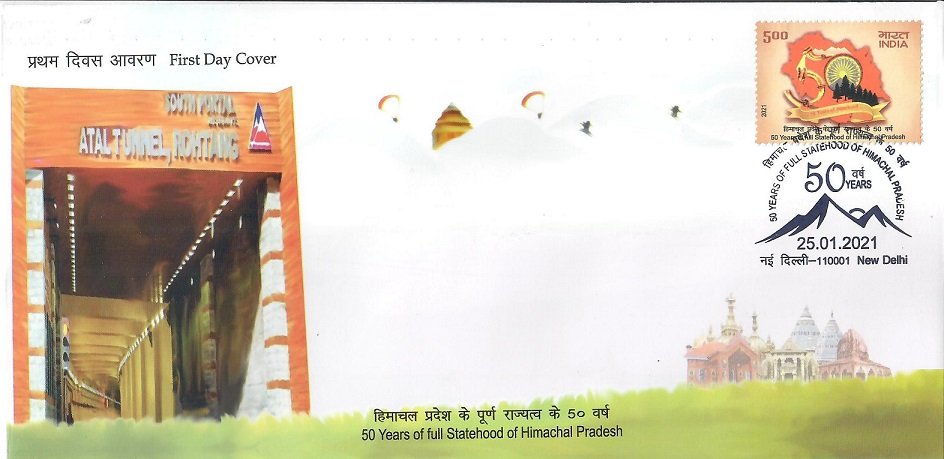50 Years of full Statehood of Himachal Pradesh

Technical Data
| Date of Issue | January 25, 2021 |
|---|---|
| Denomination | Rs. 5 |
| Quantity | 403,825 |
| Perforation | 13¼ x 13¾ |
| Printer | Security Printing Press, Hyderabad |
| Printing Process | Wet Offset |
| Watermark | No Watermark |
| Colors | Multicolor |
| Credit (Designed By) | Smt. Alka Sharma Smt. Vinita Sinha |
| Catalog Codes |
Michel IN 3720 Stamp Number IN 3249 Yvert et Tellier IN 3397 Stanley Gibbons IN 3779 Phila-India IN 3746 |
| Themes | Anniversaries and Jubilees | Maps | Seals(Emblems) |
50 Years of Himachal Pradesh Statehood – Commemorative Postage Stamp
The Department of Posts issued a special commemorative postage stamp on “50 Years of Full Statehood of Himachal Pradesh” to mark the golden jubilee of the state’s historic journey. From its humble beginnings as a Chief Commissioner’s Province in 1948 to becoming the 18th state of India in 1971, Himachal Pradesh’s story is one of resilience, unity, and remarkable progress.
The Early Years of Himachal Pradesh
Himachal Pradesh was born on 15 April 1948, just eight months after India’s Independence, through the integration of 30 princely hill states. Initially governed as a Chief Commissioner’s Province, it had an area of 10,451 sq. miles with a population of under one million.
- Mahasu district was formed by merging 26 Shimla Hill States.
- Mandi district came into being with the merger of Mandi and Suket.
- Chamba and Sirmaur were given independent district status.
- In 1954, Bilaspur was added as the fifth district.
Dr. Y. S. Parmar, a visionary leader, emerged as the architect of modern Himachal. After the first Vidhan Sabha elections in 1952, he became the first Chief Minister.
Struggle for Identity and Unity
The road to statehood was not easy. The States Reorganization Commission (1953) recommended merging Himachal with Punjab, sparking widespread protests. The people’s united voice ensured that Himachal retained its separate identity.
- In 1956, Himachal became a Union Territory, and the Vidhan Sabha was replaced by a Territorial Council.
- By 1963, the Vidhan Sabha was restored, and Dr. Parmar returned as Chief Minister.
- The demand for a “Vishal Himachal” grew stronger, advocating the inclusion of hilly regions of Punjab.
On 1 November 1966, major hill areas including Kangra, Kullu, Lahaul-Spiti, Shimla, Una, Hamirpur, Dalhousie, and Nalagarh were merged, giving Himachal its present shape with an area of 55,673 sq. km.
Attainment of Statehood
The final milestone came on 25 January 1971, when Prime Minister Indira Gandhi announced full statehood for Himachal Pradesh, making it the 18th state of India. This day is now celebrated as Himachal Statehood Day, a moment of pride for its people, leaders, and freedom fighters who struggled to preserve its identity.
Himachal Pradesh’s Development Journey
From being one of India’s least developed regions, Himachal has transformed into one of the most progressive states in the country.
Then (1951–1971):
- Literacy rate: 4.8% (female literacy only 2.9%).
- Roads: Just 288 km in 1951; under 7,740 km by 1971.
- Health institutions: 88 (1951) → 482 (1971).
- Electricity: Only 6 villages electrified (1951).
- Per capita income: ₹240 (1951) → ₹651 (1971).
Now (Golden Jubilee, 2021):
- Literacy rate: 82.8%.
- Road length: 38,000 km, with 97% of panchayats connected.
- Health institutions: 4,320.
- Educational institutions: Over 15,500.
- Electricity: 100% village electrification; Himachal is now a power surplus state.
- Per capita income: ₹1,95,255.
Horticulture, particularly apple cultivation, has earned Himachal the title of the “Fruit Bowl of India”, while steady progress in agriculture, education, health, and infrastructure has made it a model hill state.
The Golden Jubilee Commemorative Stamp
To celebrate this incredible journey, the Department of Posts issued a Commemorative Postage Stamp on 50 Years of Full Statehood of Himachal Pradesh in 2021.
This stamp not only honors Himachal’s political and cultural evolution but also symbolizes the spirit, resilience, and achievements of its people. For philatelists, it is a valuable collectible representing a landmark moment in India’s federal history.
A Symbol of Pride
The stamp on 50 Years of Himachal Pradesh Statehood stands as a tribute to the generations who fought for its identity and worked tirelessly for its progress. It is more than a postal collectible—it is a reminder of the state’s inspiring journey from hardship to prosperity.
First Day Cover

